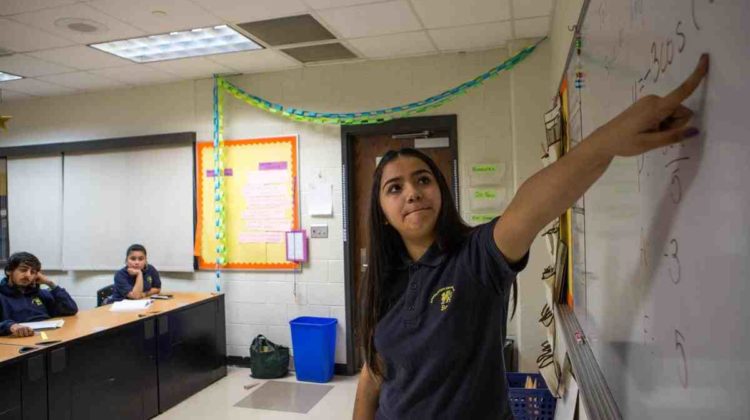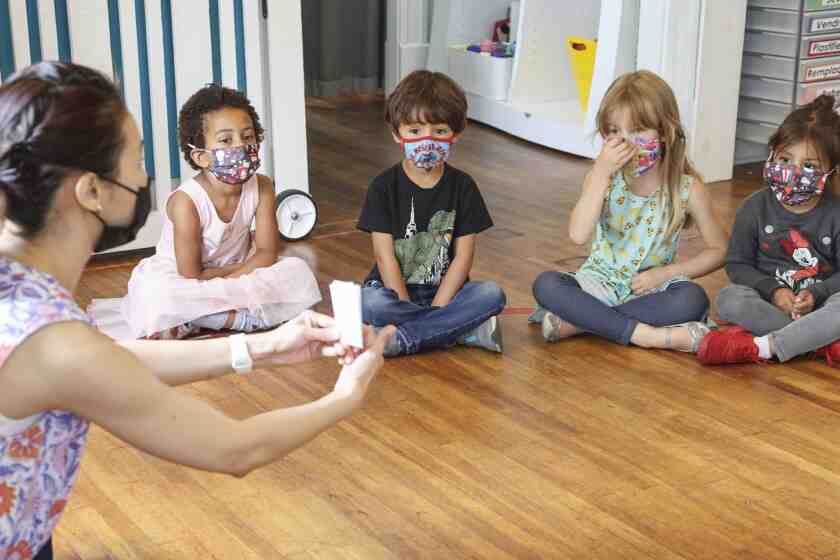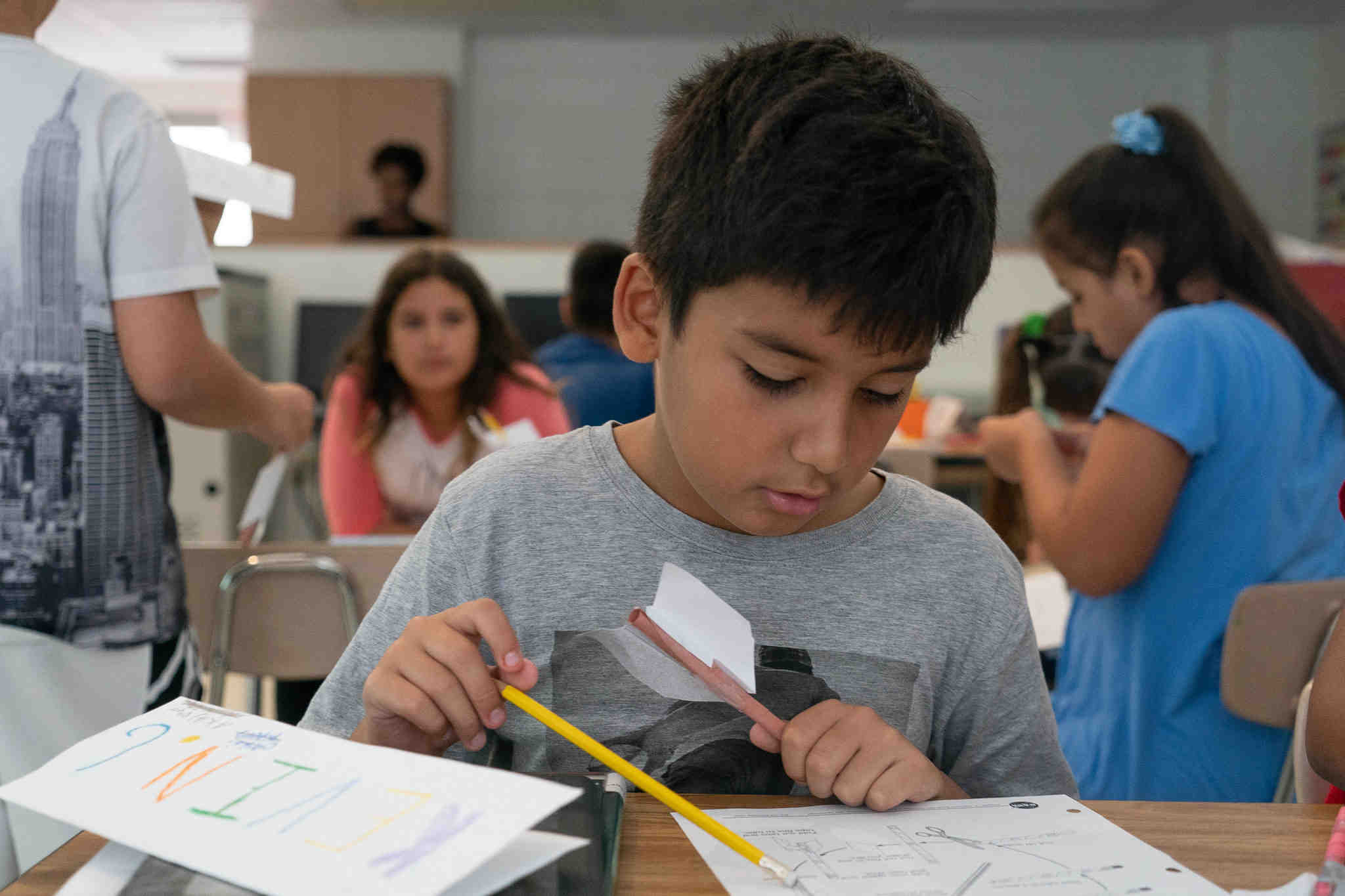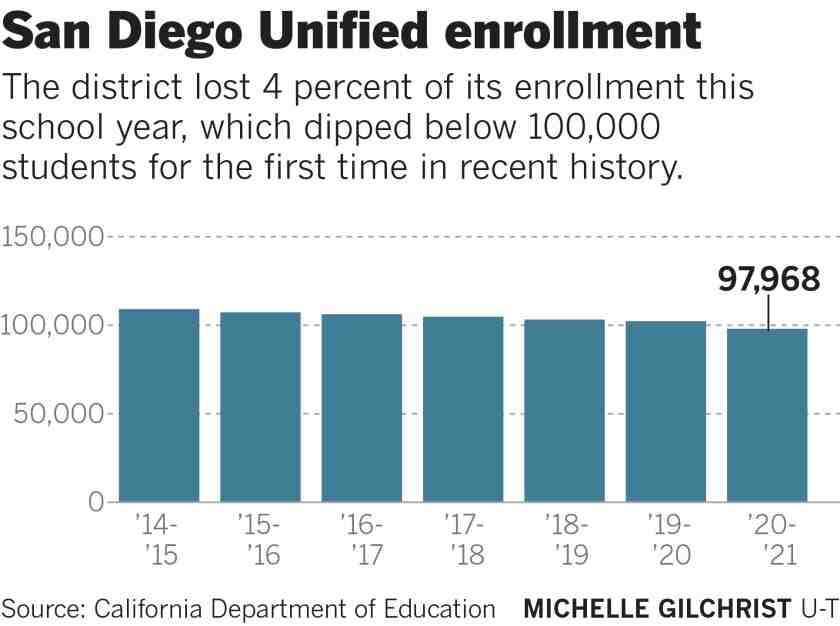
Crystal Scotten’s sixth grade daughter used to love school. Now she seems to hate it, Scotten said.
This year her school, Fund Central in Point Loma, replaced its gifted program called GATE Seminar – which Scotten’s daughters were part of – with an honors program to make it more accessible to students who don’t meet the district’s gifted identification requirements.
The changes are leading more students into advanced programs, but according to Scotten and several other Dana seniors whose children are in the gifted, rigid program they never exist again. Scotten says that his daughter has done less reading and writing, and reading texts is not challenging to him.
We offer customers exclusive access to the best journalism. Thank you for your support.
“I’ve seen the difference. He’ll come to earth and say, ‘I’m bored,’ ‘I don’t want to leave today, it’s boring,'” said Scotten, who has toured several local private schools and seen school options on earth.
Although the principal at Dana Middle said that the pace of the honors program is not slow compared to its predecessor, some seniors such as Scotten remain unsure. And they are worried about talented education programs that will be eliminated.
The San Diego Unified School District’s Gifted and Talented Education – or GATE – program, which is envisioned by parents and district leaders to be a model for school districts statewide, is shrinking.
The district has identified the fewest students for the gifted program each year since 2015. About 18 percent of age -matched students were identified for the program this year, compared with 31 percent in 2012.
Some schools have eliminated gifted education classes of choice, such as the Middle Fund, but more often it’s because schools don’t have students who are identified by talent. It doesn’t help that San Diego Unified suspended talent identification tests for the past two years because of COVID.
District leaders have been vocal about their desire to reduce the number of gifted-identified students. In 2015, the school board changed the gifted identification test to reduce what officials proposed is the number of students who are excessive as talented.
School board members also question the role of gifted programs and worry that it is segregating students. The district identifies more gifted students in low -income areas, Black and Latino students than in higher -income areas, White and Asian students.
“The kind of support that has been done for GATE and Seminars, it’s a good way of teaching, it’s a good way to work with students, but it’s not just handed over to a small group of students. It should be the way we teach all students,” said Wali Richard Barrera, who has served on the school board for 14 years.
At Fund Central, Principal Scott Irwin said that nothing about the speed or depth of the gifted class changed when the school moved to the honors program.
“The content that is taught doesn’t really change. What changes is the number of students who are given access,” Irwin said.
Parents argue that the district should keep and expand gifted programs, as well as offer other advanced courses, because they say general classes do not challenge all students or capitalize on student potential. Parents said they were concerned that the district was establishing more programming rather than doing more to be accessible and fair.
“San Diego Unified, it seems, is systematically eliminating programs that cater to special needs for students,” said Happy Aston, elder of two students in the GATE program and a GATE representative for his school.
San Diego Unified leaves it to the principal to decide whether to offer a talented program. As a result, gifted program application is inconsistent across districts.
Although most San Diego Unified schools of more than 170 schools state that they offer the GATE Cluster program by 2020, only 38 are offering classes for the GATE Seminar, which is a more advanced component of GATE. Most are offered in the richest clusters in the district – Scripps Ranch, La Jolla, University City and Point Loma – which also have the most talented students.
San Diego Unified requires classes to register 25 percent of GATE Cluster students to be called Cluster classes and 50 percent of GATE Seminar students to be called Seminar classes. So even if a school enrolls some students who are identified for the Seminar, there is no guarantee the school will offer GATE classes if there are not enough students to meet that threshold.
If the student’s neighborhood school identified by the Seminar does not offer the Seminar, the district allows them to enroll in another school. But it’s in the student’s family to provide transportation.
Principals often deploy identified talented students in the classroom, which allows them to call the classes “GATE,” rather than grouping GATE students together, which has been shown by research useful for teaching talented students, said Mary Ann Hawke, past chair. district GATE advisory committee.
“The fact that it only means that there is no class that is GATE,” Hawke said in an email. “And it’s a response that we want from many GATE seniors, that GATE education is just a name and not really an event.”
Maria Montgomery, a San Diego Unified instructional support officer who helps coordinate the GATE program, said the district supports the program by paying for teachers to become certified in GATE education and paying for gifted identification screenings. The district also provides the principal as a binder with guidance for its GATE program, Montgomery said.
Not much incentive

The shrinkage of San Diego Unified’s gifted program mirrors a larger trend in California, where gifted education has become increasingly common.
California is one of the minority states that does not require schools to identify gifted students, let alone offer a gifted education. California is also one of a number of smaller states that does not have a definition of what is to be “gifted”.
Only 56 percent of California schools identified gifted students in the 2015-2016 school year, down from 74 percent in 2000, according to a Purdue University report.
The decline can generally be attributed to the fact that California no longer provides funds to schools for gifted education.
The state used to provide funding for gifted education until 2014, when the state moved to the Local Control Funding Formula. The formula gives freedom to school districts about how they spend money but eliminates funds that are allocated to special school programs, such as bus transportation and talented education.
Not only do California schools lack financial incentives to offer talented education, but schools do not have policy incentives to offer them, said Scott Peters, a professor of education at the University of Wisconsin who studies inequality in the identification of talented.
Schools across the country are focused on closing the achievement gap for underprivileged students and raising students who are achieving below standard. Because of this, school leaders thought they didn’t want to improve education for students who were already on the high-achieving spectrum, because raising the achievement of those students would only widen the gap between them and the lowest-achieving students, Peters said. .
“If I’m the headmaster, I want to minimize disparities, or of course not make them worse,” Peters said. “It’s definitely not an incentive to challenge those high -achieving kids and help them grow.”
Talented education is thought to be more of a priority for many schools because of COVID, which leaves more students behind academically and wealth by some crises such as the spread of COVID, higher student absenteeism, loss of learning and staff shortages.
But proponents say gifted education is important because every student deserves to have years of academic growth, even if they have already achieved. And when students are bored because they are not challenged, they can lose motivation in school entirely.
The talented program also helps school districts protect from family loss and see a further decrease in enrollment. Some parents whose children’s schools have replaced the GATE program said that they’re touring private schools for the next school year because they believe private schools will provide challenges for children who don’t qualify at San Diego Unified.
“Parents whose kids need it and can afford it will go to private schools, and then we will humiliate our public schools,” said Marcia Gentry, director of the Institute for Research and Talented Resources at Purdue University.
The percentage of San Diego Unified students who are identified as talented can rise this year. The district will conduct makeup talent tests to current third and fourth grade students who did not have the opportunity to be tested during the pandemic. However, makeup testing takes place during the summer at certain school sites on certain days and times, Montgomery said.
GATE supporters worry that this new process will lose many talented students and will identify high -income students disproportionately. Some elders said that families who are unfortunate are likely unable to take their children to test sites due to lack of transportation, time or knowledge about tests.
Montgomery stated that the district was handling makeup tests in this way because it did not have the capacity to conduct universal tests for many additional students during the school year.
The district has asked all elementary school principals to tell families about the tests and send information in multiple languages about how to register for the tests, Montgomery said. The district will offer test sessions at different times of the day and in many schools and weeks to provide a working time and location for the elderly, he adds.
What strategies work well with gifted learners?

With these following strategies, teachers can tend to the complex needs of their high ability students in heterogeneous classrooms.
- Offer The Difficult First. …
- Pre-Test for Volunteers. …
- Prepare To Take This Up. …
- Speaking to Student Interests. …
- Enable Talented Students to Work Together. …
- Plans for Tiered Learning.
How do gifted students learn best? Many teachers use enrichment activities such as independent projects, small group research, and academic competitions to meet the needs of gifted students in regular classrooms, and teachers can design special classroom areas to offer advanced learning opportunities.
How can teachers support gifted students?
Create Tiered Tasks Gifted students can often understand high -grade content standards. Educators should deliberately design tasks and activities for gifted students in the regular classroom that allow them the opportunity to access content at a higher level.
Why do gifted kids end up failing?

A young, curious student can easily be turned off if the educational environment is not stimulating; classroom placement and teaching approaches are inappropriate; boys experience ineffective teachers; or assignments consistently too difficult or too easy.
Can a talented boy fail? Talented students are exceptional students who are usually not considered at risk of failure or academic problems. However, gifted students can still underachieve. There are risks related to student giftedness.
What do gifted kids struggle with?
While gifted children may be more susceptible to anxiety and depression than their age-peers, according to research by Tracy Cross and others, their unique intellectual gifts may contribute to an acute experience of anxiety / depression.
What are the negative characteristics of gifted children?
| feature | Positive Behaviors | Negative Behavior |
|---|---|---|
| Very sensitive, passionate | Emphasize justice, and morality, compassion | Over-reacts to that situation |
| Views with different perspectives | Observes across boundaries, makes connections | Resist restrictions and narrow content |
Why do gifted kids struggle socially?
Gifted children can experience social emotional difficulties because of boredom and an unchallenging curriculum. They will probably spend up to half the class time waiting for other students to follow. These children often respond to this down time by interrupting others in an attempt to entertain themselves.
Why do so many gifted kids burnout?
While other forms of burnout may be tied to the workplace, or the emotional workforce involved in care-taker roles, gifted child burnout is often tied to an educational system that the child finds repetitive, unrewarding, without autonomy, unfair, or inconsistent. their value.
Why do gifted kids get burnout?
Gifted child burnout is often tied to an education system that children find repetitive, unrewarding, without autonomy, unfair, or inconsistent with their values. Gifted kids can also experience burnout due to the unique source of stress in their lives and the expectations that come with being gifted.â €
Do all gifted kids burnout?
As children, talented children seem to be able to make good grades with little effort, but when they are older, these same children don’t always excel when they go through high school, college, and the workplace. This is typically known as gifted kid burnout.
Are high IQ students more at risk of school failure?

Abstract. Although it is established that intelligence tests positively predict academic achievement, there remains a general belief that gifted students experience difficulties in school and in particular the risk of school failure.
Do talented boys have higher IQs? People who have exceptional scores in the 99.9th percentile on IQ tests and have exceptional levels of intellectual ability. These students score at least three standard deviations above the norm on the bell curve, so they are at the extreme end of the intelligence, or IQ, continuum.
Do people with higher IQs do better in school?
The results we replicate and extend previous findings: higher IQ students scored better on all measures of academic performance, which was reinforced by higher levels of motivation and self -efficacy.
Does IQ improve with education?
Across 142 effect measures from 42 datasets involving over 600,000 participants, we found consistent evidence for beneficial effects of education on cognitive abilities of 1 to 5 IQ points for an additional year of education.
How does IQ affect school performance?
Intellectual capacity measured as intelligence (IQ) is one of the determinants of children’s school performance. It affects academic achievement, future personal health, social welfare and thus, the importance of public health.
Is there a link between IQ and grades?
(i) Grades, scores on achievement tests, and IQ correspond strongly to positive but imperfect. This strong correlation gives buyers the view that the three measures can be used interchangeably. (ii) Scores and scores on different performance tests are influenced by IQ and personality.
